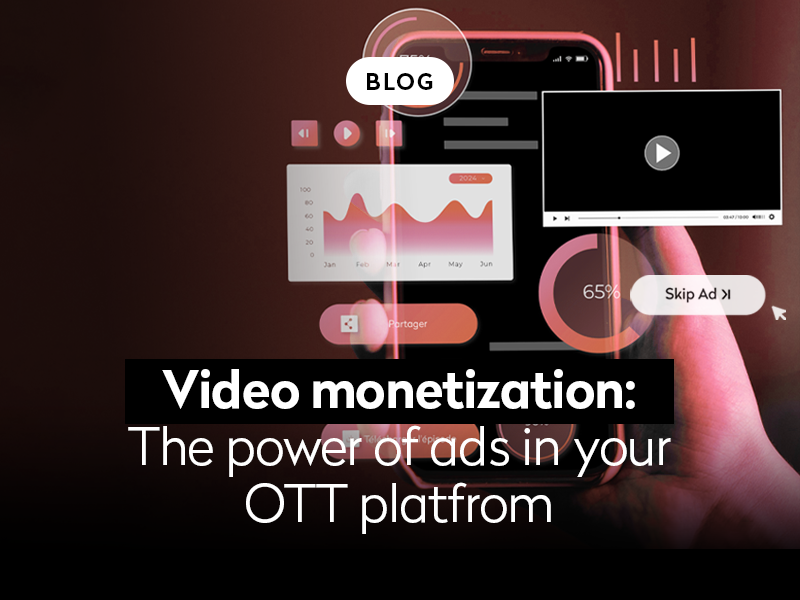Video monetization: The power of ads in your OTT platform
- Monetization
Today, consumers have become used to accessing content across multiple devices and platforms, leading to the rise of OTT streaming services. The number of OTT video service users worldwide is expected to surpass 4.2 billion by 2027, underscoring the growing importance of OTT platforms in the video streaming ecosystem.
The rise of OTT platforms has revolutionized the way content creators and publishers approach video monetization. Launching an OTT platform not only offers a gateway to a global audience but also presents a lucrative opportunity to generate substantial revenue while building a strong brand identity.
But how can streaming providers effectively harness the power of ads to maximize revenue and engage audiences in this dynamic landscape?

OTT advertising refers to the delivery of targeted ads directly to viewers within streaming video content. Think of it as the new wave of television commercials, but delivered through internet-based platforms like Hulu, Netflix (with their ad-supported tier), Disney+, and countless others.
As the OTT market continues to expand, it has become increasingly essential for content providers to explore diverse revenue streams. The latest projections indicate a staggering growth trajectory, boasting a worldwide user penetration from 45.7% in 2023 to 53.1% by 2027. In tandem, global revenue in this segment is forecasted to soar to $476 billion by 2027.
The history of video monetization can be traced back to the early 2000s when platforms like YouTube emerged as pioneers in online video sharing, relying on advertising revenue from pre-roll and display ads. YouTube's Partner Program, introduced in 2007, allowed creators to earn a share of ad revenue directly from their videos, marking a shift to more formalized monetization.
Subscription-based video-on-demand (SVOD) services like Netflix and Hulu disrupted traditional TV models, offering unlimited content for a monthly fee.
Video monetization has evolved from pay-per-view to sophisticated strategies like Dynamic Ad Insertion (DAI) and ad-supported subscription models.
Notably, hybrid monetization models are gaining momentum, with major streaming providers embracing ad-supported tiers to bolster market reach and reduce churn.
Video monetization plays a pivotal role in ensuring the sustainability and growth of video platforms. Platforms like YouTube, Hulu, and Peacock have successfully integrated advertising into their models, showcasing its effectiveness in broadening revenue streams.
Advertising offers a scalable and sustainable monetization solution, allowing platforms to generate revenue from a broader audience base. Global OTT advertising spending is projected to reach $191.3 billion in 2024, highlighting the immense potential of ads as a revenue stream for video platforms.
This financial boost fuels content creation – the lifeblood of any streaming service. High-quality programming attracts and retains viewers, fostering a thriving user base. Additionally, ad revenue helps offset rising technology costs like cloud storage and content delivery networks (CDNs). This financial stability allows platforms to invest in infrastructure and cutting-edge technology, ultimately leading to a smoother and more enjoyable user experience. It's a win-win for both viewers and platforms – viewers get access to a wider variety of content, and platforms secure their long-term success.
While subscription-based models have been a popular monetization strategy for video platforms, they come with inherent limitations. Subscription fatigue, content saturation, and price sensitivity are some of the challenges faced by subscription-based platforms. Additionally, it's important to recognize that not all users are willing to pay for content, further complicating the subscription model's effectiveness as a sole revenue stream. This disparity in willingness to pay underscores the necessity for platforms to diversify their monetization strategies to appeal to a broader audience and remain competitive in the evolving landscape of digital media consumption.
The reign of video content is undeniable, and OTT platforms are at the forefront of delivering it to a global audience. Forget disruptive commercials – OTT offers a personalized, on-demand experience. But with great content comes the need for a sustainable revenue model. This article has shown how OTT advertising bridges that gap.
However, navigating the intricacies of OTT monetization can be a challenge. This is where Alpha Networks steps in. We possess the tools and expertise to streamline the process, from optimizing your infrastructure to maximizing your revenue streams.
Don't just stream content, monetize it! Contact Alpha Networks today and turn your viewers into profits.
Cognacq-Jay Image (CJI), a leading service provider in the media industry for playout, head-end, and digital platforms, and Alpha...
Read publicationDiscover 5 practical steps to build a sustainable OTT platform. Learn how to reduce environmental impact while maintaining a high-...
Read publicationBouygues Telecom, one of the four French global communications operators – part of Bouygues group, is relying on Alpha Networks to...
Read publicationPréparez-vous à sublimer vos contenus avec des produits d'exception.
Prenez le contrôle de votre contenu et partagez-le avec le monde. Faites partie de la révolution télévisuelle dès aujourd'hui.
Parlez à un expert